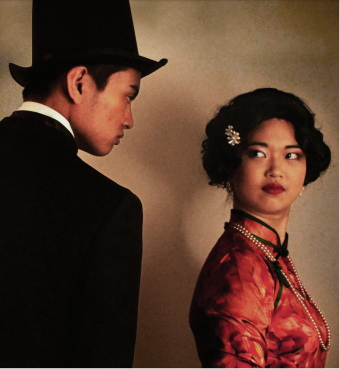
When two figures in contemporary dress and face masks first appeared on stage, The Winter’s Tale quickly branded itself as a self-aware reimagining of Shakespeare, despite most of the play’s dialogue remaining the same. In many ways, it had to be. The worldwide proliferation of coronavirus almost disrupted the play’s proceedings, with Australian performers swiftly ending their rehearsals in Hong Kong due to the virus’s escalation. It was only with the early arrival of the performers from Hong Kong in Melbourne that the whole cast was able to rehearse together before the performance round. With the production of the play precariously dependent on the wellbeing of the world, it felt oddly necessary to incorporate what was happening within it, especially with the audience so keenly astute to the times we’re living in. An astute audience would also have perceived the escalation of racial tensions around the world, a reminder that people of colour haven’t disappeared into whiteness quite yet.
Presented as a part of the Asia TOPA festival, The Winter’s Tale, directed by Bob Pavlich and Rosalind Wong, is a cross-cultural collaboration between students of the Hong Kong Shax Theatre Group and La Trobe Student Theatre. The play alternates between Hong Kong and Australia, two countries tied together by British colonisation. The timing of the play is somewhat trickier to pinpoint, jumping between the 21st century, 1970s Australia and colonial Hong Kong in the 1920s. The production itself is characterised by its cultural obviousness, allowing us to infer the pervasive consequences of colonisation, racism and migrant movements that are buried in our collective histories.
The dramatic first act is set in colonial Hong Kong where Leontes (Kevin Lorenzo Erodias de Gauzman), a civic leader, unrelentingly accuses his wife, Hermione (Karen Wang) of fraternising with the Australian politician Polixenes (Cole McKenna). This segment begins with a woman who dons a qipao, performing a traditional dance to the sound of strings. What unfolds feels like a scene from a Hong Kong soap opera that concludes with Hermione’s newborn child, Perdita, banished on Australian shores and Hermione allegedly dead. In the second act, tragedy meets comedy as we are greeted by a larrikin father and son (Paul Doogood and Lakshmi Ganapathy). Perdita (Monica Wat Tsz Yan) is raised by the outlandish duo and the trio become a family band, with a standout Yan gracing the audience with her singing. She falls in love with gawky son of bigoted politician, Florizel (William Foley), but is ultimately forbidden to marry him by his father, Polixenes, until it is revealed that she is a princess. The act concludes with the unification of Perdita and her birth family and the revival of a dead Hermione by Paulina (Evangeline Oster).
Pavlich’s revisioning of The Winter’s Tale introduces new contexts to the play, most notably, cultural identity. In a society that apparently champions diversity, identity is always seen and interrogated. When Pavlich added this characterisation and setting to The Winter’s Tale, he added visibility and history of these places in contrast to our own. The place of the characters is significant because they cannot extricate themselves from their histories and what the world perceives them to be. It’s possible to read Shakespeare’s dialogue in the context of Hong Kong and Australia’s relationship with each other, and the greater world.
The play’s first act occurs during the British occupation of Hong Kong. With this context in mind, Leontes’ unwavering accusations of Polixenes’ betrayal seems to reflect the resentment of Asian men who view Asian women as being ‘stolen’ by colonisers, particularly in cultures that have been oppressed by Western empires. This is demonstrated by Leontes’ doubt of Hermione, and his decision for her to face trial for treason. On another note, Perdita’s banishment to Australia is reminiscent of immigration, especially from other colonies to Australia. Immigration from non-white countries was not tolerated in Australia under the White Australia policy, and Polixenes’ hostility towards Perdita’s union with his son evokes the discriminatory attitudes of the time. However, he eventually accepts friendship with Leontes again, perhaps an action symbolising the Western world’s embrace of Hong Kong for its adoption of democratic values, by contrast to China’s one-party system.
But more than anything, this reimagining of The Winter’s Tale reminds us that the consequences of our darker transnational histories are closer than we think. We’re all influenced by our colonial past, from the decisions of our political actors to our own attitudes. With conflict tying the world together, the repercussions of imperialism and colonisation are slowly coming into focus.
A co-production between La Trobe Student Theatre and Hong Kong Shax Theatre Group
Director: Bob Pavlich with initial support by Rosalind Wong
Producers: Kat Carrington, Rosalind Wong, Ujjwal Sharma
Costumes and Choreography: Vision Wong
Lighting and Sound Designer: Jacob Shears
Project Liaison: Helen Mayers
Performers: Karen Wang, Monica Wat Tsz Yan, Wincel Sagana Capiendo, Cole McKenna, Kevin Lorenzo Erodias de Guzman, Kyo Wing See Cheung, Rohit Sharma, Evangeline Oster, Paul Doogood, Lakshmi Ganapathy, Jayde Hopkins and William Foley

